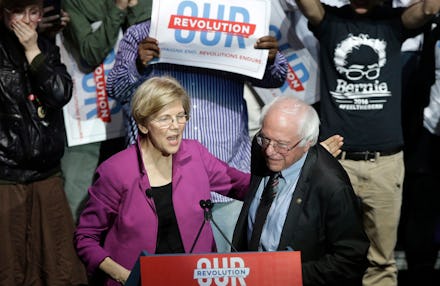Everything to know about the 2020 Democratic debates

The first debates of the 2020 presidential election are here, with 20 of the 24 Democratic candidates about to take the stage in two separate events. You won't want to miss out — not only will the debates mark the first time many of the candidates will be in the same room with each other, but they'll provide an opportunity for the American public to scrutinize the people hoping to be the next president. If you're thinking about tuning in, here's everything to know, from who is participating to how to watch the Democratic debates:
When do the debates air?
The first group debate will air on Wednesday, June 26 at 9:00 p.m. to 11:00 p.m. EST. The second will air at the same time on Thursday, June 27.
Where can I watch them?
The debates will be televised on three networks: NBC, MSNBC, and Telemundo. If you don't have access to a TV, you can stream the events instead on the NBC News and Telemundo websites, as well as the NBC News app. NBC News will also be running streams on its Facebook, Twitter and YouTube pages in English, while Telemundo will be doing the same on its pages in Spanish. The best part? All the streams are free.
If any of those options don't work, you can also use the hashtag #DemDebate on Twitter, which will take you to the live broadcast.
Why are there two separate nights?
Because 20 candidates on one stage would be very, very crowded.
Who's going to be there?
The Democratic National Convention (DNC) randomized the groups so that the highest polling candidates (Joe Biden, Bernie Sanders, and Elizabeth Warren) weren't placed in the same debate.
The first night will feature Warren, New Jersey Sen. Cory Booker, Minnesota Sen. Amy Klobuchar, former Texas Rep. Beto O'Rourke, Dallas Mayor Julián Castro, former Maryland Rep. John Delaney, Hawaii Rep. Tulsi Gabbard, New York City Mayor Bill de Blasio, Ohio Congressman Tim Ryan, and Washington Gov. Jay Inslee.
On the next night, there'll be former Biden, Sanders, Colorado Sen. Michael Bennet, South Bend Mayor Pete Buttigieg, New York Sen. Kirsten Gillibrand, California Sen. Kamala Harris, former Colorado Gov. John Hickenlooper, California Rep. Eric Swalwell, spiritual author Marianne Williamson, and entrepreneur Andrew Yang.
How did the candidates qualify?
In order to make the cut for the debates, the DNC determined that candidates had to meet one of two requirements: earn one percent of polling data support in three separate, legitimate polls or receive 65,000 donations to their campaigns from 20 different states, with at least 200 different people donating from each state.
These qualifications only excluded four candidates: Massachusetts Rep. Seth Moulton, Montana Gov. Steve Bullock, former Alaska Sen. Mike Gravel, and Miramar, Florida Mayor Wayne Messam. If these names don't sound familiar to you, that's probably part of the reason they aren't participating in the debates.
What are the rules?
Given the number of participants, the structure of the debates is designed for brevity. According to NBC, there will be no opening statements, and each candidate will be given 60 seconds to answer questions, with 30 seconds for rebuttals. Each debate will be done in five different sections, separated by four commercial breaks.
Who will be moderating?
Journalists Savannah Guthrie, Lester Holt, Chuck Todd, Rachel Maddow and José Diaz-Balart — who all have their own programming on NBC, MSNBC, or Telemundo — will moderate the debates. Holt, who previously led the debate between Hillary Clinton and Donald Trump in 2016, will anchor the moderation.
There's no telling if the first 2020 debates (yes, there will be many more) will garner insightful answers from their participants, but at the very least, with so many people on-stage, they'll be a very interesting watch.